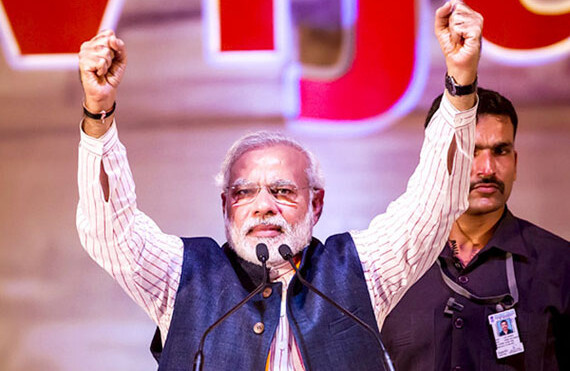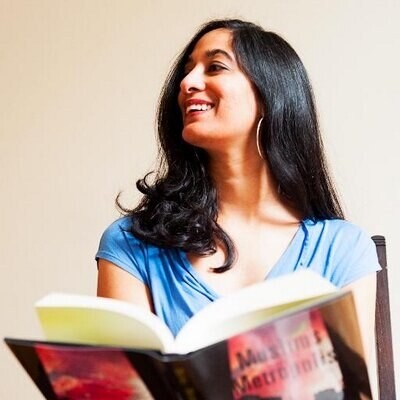Hindus love to tell you that India does not have a problem with Islamophobia.
A known Hindu nationalist will become prime minister of more than 10 percent of the world's Muslim population on May 16. While they have been a topic of some discussion in this election, India's estimated 176 million Muslims remain largely invisible and voiceless.
Hindus love to tell you that India does not have an "Islamophobia" problem. Countless highly educated, otherwise thoughtful Hindus across the country and the diaspora say, as if in verbal lockstep, that the election is really just about economics. But the fact that Narendra Modi can be repositioned as an "economics candidate" simply underscores the depth of Indian Islamophobia—a mere 12 years ago he presided over a state in which 790 (the official number, widely contested) of his Muslim constituents were murdered under the averted eyes of his police and local officials.
Coined in 1991 by the Runnymeade Trust in the context of anti-Muslim immigrant sentiment in the United Kingdom, Islamophobia was first defined as "unfounded hostility towards Muslims, and therefore fear or dislike of all or most Muslims." In the West, progressives (including first- and second-generation immigrant Hindus) document anti-Muslim commentary, legislation, and community sentiment in an effort to illustrate what Islamophobia looks like in contemporary public life. Why wouldn't genocide count as an example?
On May 2 it was reported that nearly two dozen Muslims had been murdered by tribal militants in a series of executions in the northeastern border state of Assam. In response, Modi called for the mass deportation of millions of undocumented Bangladeshis living in India, as if Muslims are responsible for their own murders simply by being in India. Such prejudice in a head of state indicates that he may be a far more destabilizing force than anyone imagines.
When my book Muslims of Metropolis was published in 2008, the prominent Indian-American weekly India Abroad published an interview with me, which was picked up on Rediff, a popular Indian news and entertainment portal. The comments on Rediff were scathing, and left me confused. The angle of attack varied but a common thread was clear: I was a traitor to my people. But how could the immigration stories of Muslim families living in Western cities—stories so similar to that of my own family and millions of other immigrants—constitute a betrayal to the Hindu people?
Soon after my book was released, 164 people were killed by an Islamist militant group in a brutal series of attacks in Mumbai, a city 800 miles, three states, and at least four official languages away from my hometown, Chennai. A relative told my mother that now was not the time to be reading a book like mine, now was the time to be reading Bharatvarsha, ancient Indian history. At a moment when external enemies had clearly infiltrated the country and unleashed terror on our people, I was struck by how quickly the loyalty of Indian Muslims could be called into question, and how wide the blanket of Hindu tribalism truly is—that merely showing empathy with any of the world's 1.6 billion Muslims could impugn a Hindu's loyalty and identity.
As the ascendance and continuing political prowess of the Hindu nationalist Bharatiya Janata Party shows, many Hindus still consider Muslims as outsiders, as the enemy within. Increasingly, membership in the Hindu ranks means tacit adherence to this narrow and destructive view.
Many would argue that fear and hostility toward Muslims is far from unfounded in light of the recurring bloody acts of communal violence that have punctuated Indian life since Independence. Yet whether or not Modi actively participated in the 2002 genocide, he has been stained by it in the hearts and minds of India's Muslims, and this stain should have prevented him from repositioning as a moderate candidate.
What is at play in India is a profound and decades-long erasure of the Indian Muslim face and voice.
What is at play in India is a profound and decades-long erasure of the Indian Muslim face and voice. Long before the attacks, I heard my Chennai friends and relatives casually say dehumanizing things over dinner about the Muslims living among them—such as "they multiply like rabbits." And yet, I have found no indicative research on the purported higher birthrate among Indian Muslims—how birthrates vary across Muslims in different Indian states or cities, or income levels.
In general, Indian scholarship and media lack meaningful discourse about Muslim diversity in India. Indian Muslims hail from half a dozen different Islamic traditions and dozens of ethnicities. There are at least three major indigenous Muslim ethic groups in Assam alone. Many Indian Muslims divide themselves, in a not-so-Islamic fashion, along caste lines. They live in cities and in villages, in every Indian state, sharing more with their fellow Malayalis or Andhras than they do with other Muslims in Haryana or Kashmir.
And yet, in Indian public discourse, they are rendered faceless and monolithic. One might argue that there is no single Indian Muslim identity and politics any more than there is a unified Hindu one.
Hindus and Muslims have shared a country for more than 50 years, and have shared the same cities and towns for hundreds of years. They live side by side. India's biggest movie stars are Muslim. A former president is Muslim. On college campuses across the country, it is nearly impossible to distinguish Hindu and Muslim Indians from each other based on gestural language alone.
Social fabrics are delicate things, and in a country with as many different threads as India, it is a fabric easily rent.
Social fabrics are delicate things, and in a country with as many different threads as India, it is a fabric easily rent. Diversity and pluralism in India will never look like it does in New York City (there have been plenty of riots in Europe). There is tribalism and communalism and the blood memory of recent and regular paroxysms of horrific violence.
But at some point, a modern constituency will have to acknowledge that, in electing a nationalist party to power, and allowing it to appoint an apologist of genocide to the highest office in the land, it is sending a message to its Muslims that their feelings and rights do not matter. That they should not bother seeking to belong in this, their land, because the people who run things will never see them as such—if they see them at all.




